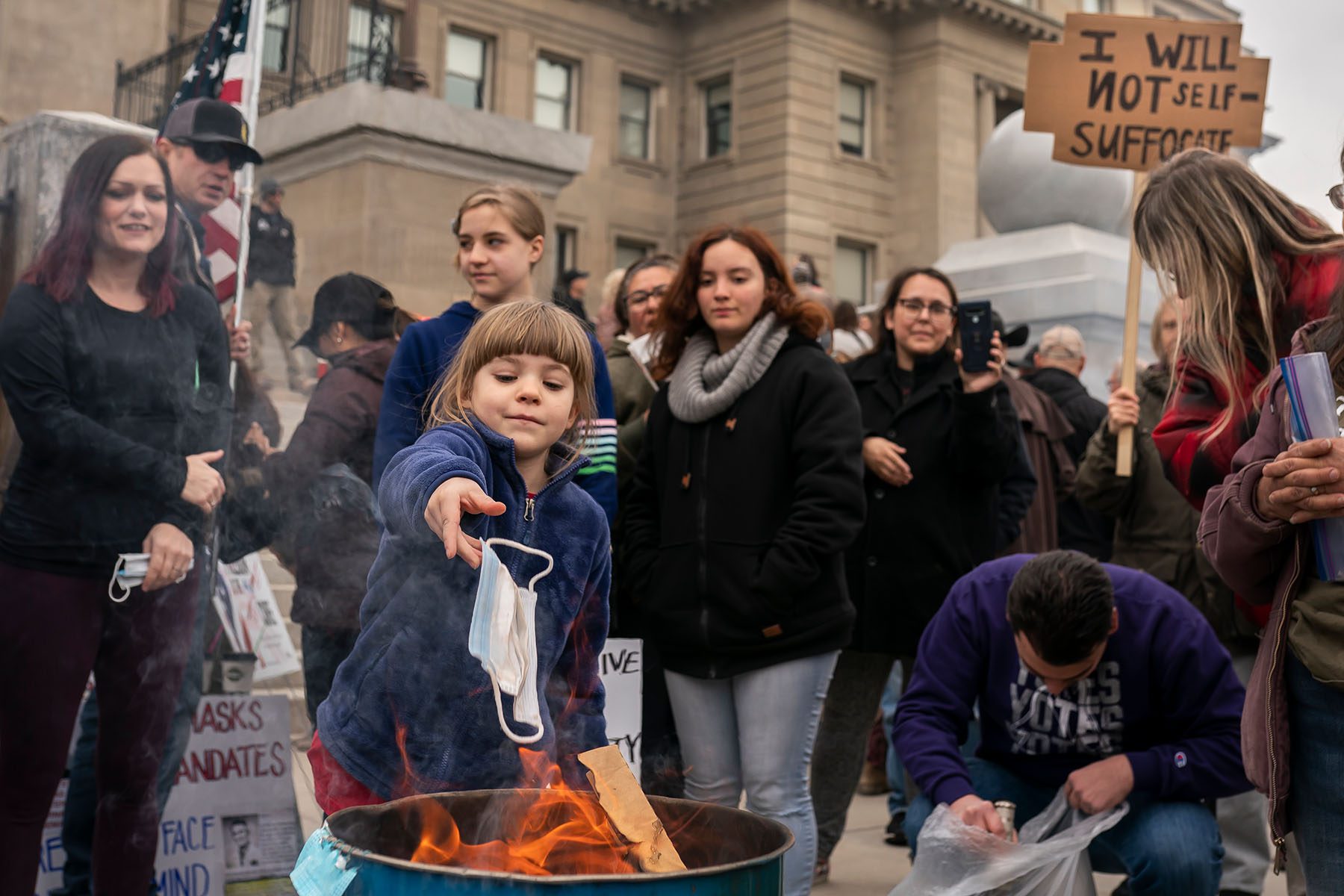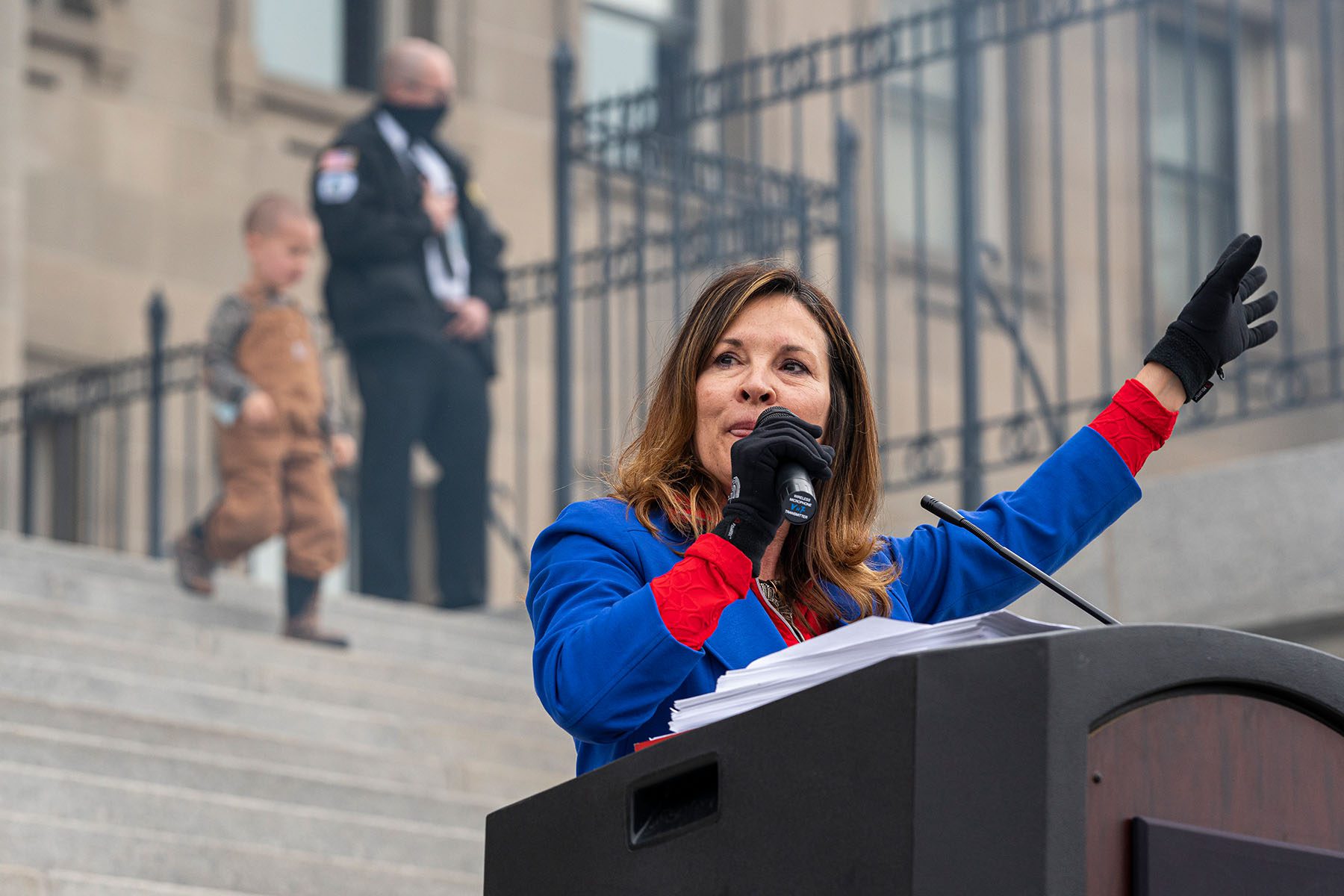In 2019, just months into her job as Idaho’s lieutenant governor, Janice McGeachin posted a photo of herself outside her statehouse office with two men linked to a militia group. Weeks later, she delivered an oath to militia members that is often reserved for state military.
McGeachin’s embrace of extremism would continue: In October 2020, she appeared in a libertarian group’s video against state COVID-19 restrictions, placing a gun on top of a bible. In February, she agreed to a pretaped speech at a conference hosted by the white nationalist Nick Fuentes. This month, McGeachin told an anti-vaccine conspiracy theorist that “God calls us to pick up the sword and fight, and Christ will reign in the state of Idaho.”
McGeachin is challenging Gov. Brad Little in Tuesday’s primary for governor, arguing her candidacy better reflects the values of a state where former President Donald Trump received more than 60 percent of the vote in 2020. Idaho has a history of anti-government sentiment, which has gradually created factions within its Republican Party between far-right populists like McGeachin and more traditional conservatives like Little.
Like many GOP candidates across the country, McGeachin has highlighted her opposition to COVID-19 mitigation efforts as well as teachings about racism in schools. But McGeachin has taken these issues further than many in the Republican Party by not only sowing doubt about the 2020 election results but also supporting “state sovereignty” that actively rejects areas of federal government oversight.
Whether McGeachin’s long-shot bid in a crowded primary is successful or not, her attempt to unseat Little has become a flashpoint in the discussion of extremism in state politics — and White women’s role in it.
“What happens on the far right is that there’s a way in which White women are kind of the velvet glove on the iron fist,” said Jessie Daniels, a researcher on extremism and author of “Nice White Ladies.” “They soften in some ways the real brutality of these policies.”
McGeachin, a business owner who was elected lieutenant governor in 2018 after a brief stint away from serving in the statehouse, has campaigned on a platform of challenging the 2020 election. At a campaign rally this month, the 59-year-old described her vision as “protecting individual liberty, defending your health freedom and upholding your constitutional rights.”
-
More from The 19th
- Donna Edwards was on a journey. Now, she wants to win her old House seat back.
- Pennsylvania didn’t have a pipeline for candidates like Summer Lee — so she helped build one
- Blue states have passed laws to shore up abortion access, but it may not be enough to address potential surge
“It includes defending Idaho’s state sovereignty, reducing Idaho’s financial dependence on federal dollars and strengthening our economy through the development of our state’s many resources,” she said.
She has also embraced many of the issues propelling the right. At the same campaign rally, McGeachin committed to “fixing” Idaho’s education system, “eradicating” critical race theory — a catch-all phrase used by some Republicans to describe certain lessons about race — and what she calls “other forms of Marxist indoctrination.” Last year, McGeachin announced a task force that would target “indoctrination” in schools. And after a leaked U.S. Supreme Court draft indicated Roe v. Wade will be overturned, McGeachin called for a special legislative session to end exemptions to abortion that include cases of rape and incest. Such exemptions have been widely supported by conservatives who oppose abortion.
Little, a sheep and cattle rancher, has tried to frame his campaign around cutting taxes and state regulations. But he also signed into law a ban on abortion after six weeks of pregnancy this year. In 2020 he signed anti-trans legislation into law.
However McGeachin has also chosen to publicly associate with media personalities who hold views about the pandemic, immigration, elections and race that are outside mainstream conservatism. McGeachin defended her speech at the America First Political Action Conference — hosted by Fuentes, who participated in the 2017 white supremacist rally in Charlottesville and has denied the Holocaust — by claiming she didn’t know who he is. McGeachin also said she wanted to reach young conservative people.
“There’s a growing number of conservatives, young conservatives all across the country, that are really concerned about the direction that our country is headed,” she told television station KTVB in February.
McGeachin, whose campaign did not return a request for an interview, has also not shied away from other far-right figures. Her May 4 rally was attended by Stew Peters, who has pushed anti-vaccine conspiracy theories, and Michelle Malkin, who has been described by the ADL as supportive of white supremacists. Wendy Rogers, an Arizona senator who was censured by fellow state lawmakers in part because she, too, recorded a message for Fuentes’ conference and suggested the hangings of unspecified “traitors,” was also in attendance.
Kelly J. Baker is an author who has studied religion and white supremacist movements. She noted that McGeachin sometimes echoes language used by far-right personalities but can also be ambiguous about it. Trump, who has endorsed McGeachin, took a similar tactic, refusing at times to denounce white supremacists who supported him.
“When she’s speaking at something organized by white nationalists or participating in events with far-right figures, she isn’t disavowing them,” Baker said. “But that kind of ‘winking in that direction’ is a strategy that I think works to get voters who are sympathetic.”
Baker added that McGeachin’s self-described identity as a mother, coupled with being a White woman, may be advantageous to her campaign and has echoes of politicians like Sarah Palin and her bid for vice president more than a decade ago.

“Their rhetoric is still rough, right? And the things they are saying are pretty bombastic and controversial,” Baker said. “But I do wonder if there’s something about gender roles that are working for them — that they’re able to play into this somewhat in a way that White men don’t have the option to.”
Heath Druzin is an Idaho-based journalist who hosts the “Extremely American” podcast covering militia groups and politics. He has reported on McGeachin for years and noted that other far-right women candidates are running campaigns in Idaho, including for lieutenant governor and secretary of state. Many of them have been elected to office before their current bids.
“It’s not that they appeared out of nowhere,” Druzin said. “They have been leaders in the far-right movement in Idaho for a while. But it’s more that the far right just gained a lot more prominence recently, especially with the pandemic. And they were sort of there ready to step into the spotlight.”
In Idaho, candidates for governor and lieutenant governor run on separate tickets in both the primary and general election. The fissures between McGeachin and Little started soon after the two were elected. McGeachin would gain acting governor status when Little was out of the state, and several times she used that authority to try to change state policies. Her informal oath to two members of a militia group happened during one such stint.
Some of her administrative actions focused on pandemic measures: In May 2021, McGeachin signed an executive order banning mask mandates. Little rescinded the order and called it an “irresponsible, self-serving political stunt.” Then in October, she signed an executive order banning COVID-19 vaccine mandates and testing. Little again quickly rescinded the order.
Druzin said his reporting indicates the effects of COVID-19 restrictions gave far-right movements and its supporters new talking points.
“Without the pandemic, Janice McGeachin might still be running,” he said. “But I think she would be getting a lot less oxygen.”
McGeachin’s campaign is being tracked as one indicator of Trump’s ongoing political power as he eyes a 2024 presidential run. He endorsed her in November, something McGeachin has featured heavily in her promotional materials, including on social media. Trump’s snub of Little has not weakened the incumbent’s public support for the former president — and it may not be hurting him either. Little has a substantial lead over McGeachin in both polling and fundraising.
Jaclyn Kettler, an associate professor of political science at Boise State University, said that while McGeachin’s pandemic-related actions appears to have boosted her popularity, it still may not be enough to best an incumbent.
“She clearly had some strong support, but whether or not that’s enough to mobilize against the incumbent governor, was probably going to be a fairly large task,” Kettler said.
Robert Boatright, a political science professor at Clark University in Massachusetts, has studied the intersectionality between primaries and extremism. He cautioned against making too many assumptions about what a primary outcome in a state with a history of conservative infighting means for other areas of the country.
“It’s important to put these things in context so that we don’t draw these giant lessons from it,” he said. “We can make an idiosyncratic race this giant national narrative about what is happening in our politics, and sometimes, that’s a little bit of an over interpretation.”
Others see McGeachin’s bid as a possible preview of future election dynamics elsewhere. Melissa Ryan, a consultant who works to combat disinformation and extremism and writes a newsletter on the subject, said gerrymandering, as politicians draw more safe seats for both major parties, could lead to more extreme views from candidates as they don’t have to court voters with as many perspectives. She specified the Republican Party’s gerrymandering tactics.
“I think it’s really important to point out that what’s happening in Idaho is happening in races all across the country, everywhere from city council to U.S. Senate,” she said. “The trend is going to get worse before it gets better.”
And it’s not just American politics. Daniels noted the gradual political rise of other far-right women in countries like France, where the far-right candidate Marine Le Pen lost against President Emmanuel Macron in April but by a smaller margin than her previous attempt in 2017. Le Pen took a more moderate approach this time, focusing on economic issues. It’s possible more women with extreme views outside of mainstream conservatism will pick up the mantle. Daniels recommended people hold their elected officials accountable when that happens.
“I think that the Idaho governor’s race is really going to be a harbinger of what comes next on the national and international stage,” she said.







